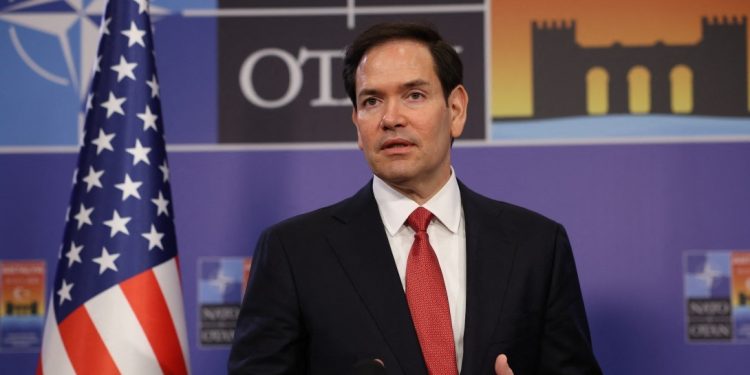U.S. Secretary of State Marco Rubio expressed optimism on Thursday that Syrians will seize the opportunity created by newly lifted U.S. sanctions to rebuild their war-torn country and contribute to broader regional stability. Speaking to reporters ahead of a NATO foreign ministers’ meeting in Antalya, Turkey, Rubio described President Donald Trump’s recent decision as a strategic move to help transform Syria from “a source of instability into a beacon of regional stability.”
“Trump Opposes War and Chaos”
“The president opposes endless wars and the terrorism that breeds chaos,” Rubio said. “That’s why he made the bold decision to lift sanctions on Syria.” The move follows Trump’s landmark meeting with Syria’s transitional president, Ahmad al-Sharaa, in Riyadh on Wednesday—an encounter widely seen as a pivotal moment in Washington’s evolving Middle East policy.
Rubio stressed that the lifting of sanctions should not be viewed as a blank check, but rather as an opportunity for Syrians to rebuild. “It is now up to the Syrian people and their new leadership to chart a constructive path forward,” he said.
High-Level Talks in Antalya
Rubio’s remarks came just hours ahead of his scheduled meeting in Antalya with Syria’s interim Foreign Minister, Asaad Shibani. Turkish Foreign Minister Hakan Fidan is also expected to join the trilateral talks, which will focus on the technical and legal framework for sanctions removal and mechanisms for future cooperation.
In a televised interview on Wednesday, Fidan confirmed that the meeting would include “detailed coordination on sanctions relief and economic normalization.”
Trump Backs Syria’s New Leader
Meanwhile, President Trump offered strong support for President Sharaa during a press conference in Doha on Thursday, following their meeting the previous day in Riyadh. “He struck me as a strong and sincere leader,” Trump said. “He wasn’t weak, and I believe he genuinely represents his people.”
In typically blunt terms, Trump added: “I like the new guy. I think he deserves a chance.”
This marks a significant shift in U.S. policy. During a keynote speech at the U.S.-Saudi Investment Forum earlier in the week, Trump had already announced the full repeal of U.S. sanctions on Syria. “For the first time,” he declared, “there will be normal relations between the United States and Syria.”
He characterized the move as a first step toward diplomatic normalization and economic re-engagement, “so that Syrians can finally begin to rebuild their future.”
A Shift With Global Implications
The back-to-back developments—from the Riyadh summit to the Antalya diplomatic meetings—signal a major reorientation in Western policy toward Syria. Once considered a pariah state, Syria is now being cautiously reintegrated into the international arena, following the collapse of the Assad regime and the establishment of a transitional government composed largely of former opposition figures.
Still, U.S. officials insist the process will be closely monitored. “We’re watching what happens next,” Trump said in Doha. “But we made this decision to give Syria a new opportunity. Let’s see what they do with it.”
As Syria seeks to reestablish itself on the global stage, the U.S. policy shift presents both a challenge and an opening. If the country’s new leadership can turn promises of reform into tangible change, Syria may indeed be entering a new chapter. But the burden of proof now lies with Damascus.
This article was translated and edited by The Syrian Observer. The Syrian Observer has not verified the content of this story. Responsibility for the information and views set out in this article lies entirely with the author.


